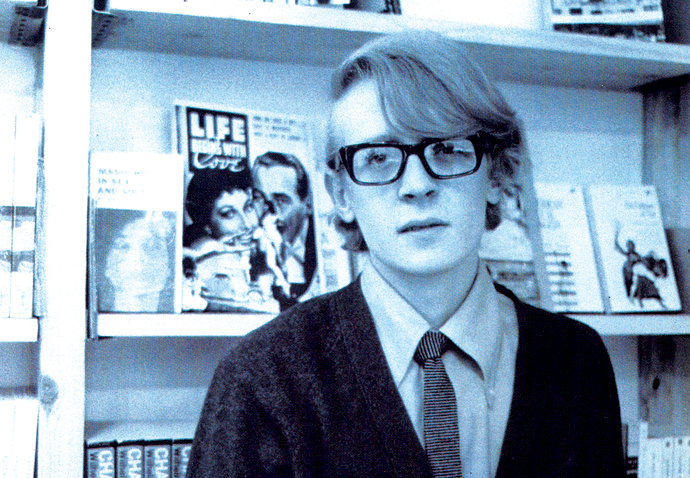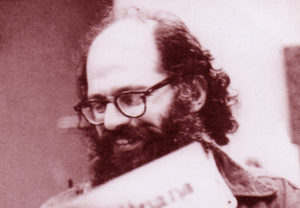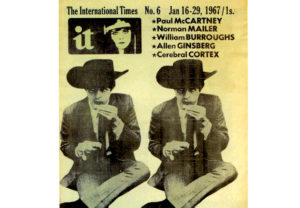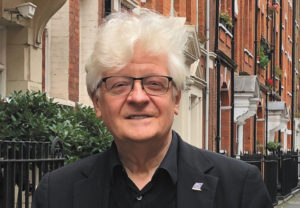Far out! The bookseller who can remember what made the 60s swing
Unlike many, Barry Miles’ memories of the 1960s are crystal clear. Dan Carrier talks to him about the reprint of his seminal account of the period
Friday, 27th October 2017 — By Dan Carrier

Barry Miles when he was working at Indica
THEY say if you can remember the 1960s, you weren’t there. But Barry Miles most definitely was, and has a very handy aide memoire to draw on. A bookseller who ran the iconic Indica bookshop and set up the underground newspaper The International Times, as well as running The Beatles’ spoken word record label, he was friends with the people who made it swing.
And as well as being a crucial player in the London cultural scene, he wrote prolifically.
In 2002, he used his notes to produce the book In The Sixties, and now, 15 years after it was first published, it has been expanded and reprinted.
Miles, as he is known, lives in Fitzrovia and his story tells of a time when London was in the midst of massive cultural change.
This is a personal history, but through its pages we get a much larger picture of a seminal moment in modern times. We follow Miles from Stroud Art College to London, where he ran Indica and was friends with just about everyone, then to America and back.
The book draws on journals he wrote at the end of the decade and his friendship with the poet Allen Ginsberg, who acted as a catalyst for the tome. “In the end of 1969, all of us were just really tired,” he recalls. “There had been too many drugs and too many late nights for a decade.

Allen Ginsberg flicking through a copy of Marijuana Review
“Allen asked to me, would I like to live on a farm in upstate New York and chill out for a while. He had a project in mind – to catalogue his tape archive. He had 300-400 reels of tape going back to the 1950s. We had an idea of doing a 10-album box set of Beat poets.”
In The Sixties is incredibly detailed – and this trip to stay with Allen is the reason why.
“Allen was a tremendous groupie,” he recalls. “He loved gossip and stories and he said he wanted to know all about The Beatles, The Stones, and what the 1960s in London was all about. He always used to stay with me when he came to London, I would tell him all these stories and kept saying you must write this all down. It was only about six months from the 60s and I could still remember a lot of stuff. I sat down and tried to remember what I could… Beatles’ recording sessions, happenings, and stuff like that.
“I could actually remember a lot of stuff. I filled two journals. “I could remember what George Martin’s wife was wearing at a dinner party. I had 500,000 words filling up two big volumes.”
We hear of Paul McCartney’s generosity – he would bank roll arts projects simply because he thought they may be interesting, and supported Indica through hard times – and of drug experimentation, of Beatles’ recording sessions, of parties at the famous UFO club, of Pink Floyd, and a carousel of tales of household names.

Paul McCartney on the cover of The International Times. McCartney volunteered to be interviewed in order to boost the publication’s advertising
He also offers a view as to why the 1960s saw such an explosion of art and pop culture.
“We were the children of the Education Act,” he says. “We were better educated than our parents and it was obvious that to go back to a Britain before the war would have been absurd. That world had caused the Holocaust, world war, Hiroshima, Nagasaki. A new way of life was essential. Everyone was interrogated. We listened to avant garde jazz – Charlie Parker, Miles Davis. We read the Beats. We were looking for a way of life. Some of it led to good things and some of it led to Charles Manson – there is no denying that. It turned out to be a pretty good set of choices. Out of that came a different Britain.”
There was also a need for young people to find ways to express themselves. “Britain was boring: TV was monochrome and there were only three channels,” he adds. “The pubs were shut half the time.”
The politics of the period gave them a cause, the drugs a way of looking at things differently, music something to dance to.
Barry Miles
“What we did may have been naïve, distorted, ass-backwards and hopelessly idealistic,” he says.
“But we were stumbling towards something better. Out of the Sixties’ underground scene grew the ecology movement, with Greenpeace, Friends of the Earth and the Greens; the women’s movement; an official if not a public acceptance of a multi-cultural society; equal rights for homosexuals and in general a greater tolerance for alternative lifestyles and a greater understanding of victimless crimes, be they in choice of drugs or sexual practice, even though they remain on the British statute books.”
This book is an extraordinary document of a time that, through the telescope of history, shows just how important those days were and still reverberate today.
• In The Sixties. By Barry Miles, Rocket88 Books, £30, www.inthesixties.com
